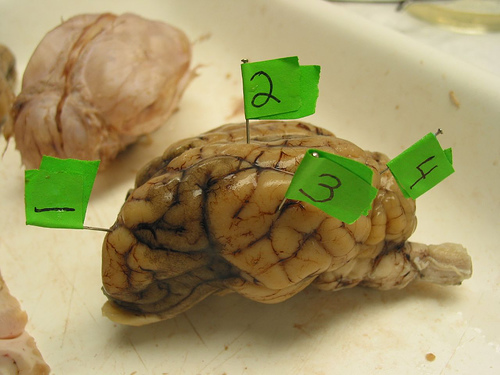
“Brain surgery” (photo by Ilona Angervuo).
Philosophy and the habits of Critical Thinking
Conversation with John Searle
Philosophical Problems
Is it hard to do philosophy?
It’s murder, absolutely. I compare it … if you really want to know how to do it, you get up in the morning, there’s a large brick wall and you run your head against that brick wall. And you keep doing that every day until eventually you make a hole in the wall. That’s what it feels like.
But metaphorically the wall has ceased to exist, right? Using the metaphor that you’re always …
Unfortunately I keep banging the wall. And then once I get one wall battered into shape then I’ve got to work on another one. Now the way it actually works out is that you’re constantly fighting with a whole lot of apparently contradictory ideas, and yet they all seem appealing and you have to find some way to resolve them.
So take an obvious case. We’re all conscious and it’s real. All you do is pinch yourself and you know this is real. How can matter be conscious? You know, what you’ve got in your skull is about a kilogram and a half, three pounds of this gook. It’s about the texture of English oatmeal — it’s slimier. And it’s gray and white. And now how can this three pounds of gook in your skull, how can that have all these thoughts and feelings and anxieties and aspirations? How can all of the variety of our conscious life be produced by this squishy stuff blasting away at the synapses? A hundred billion neurons, glial cells, synapses, how does that produce consciousness? And that’s typical of philosophical problems. On the one had you want to say, well, consciousness couldn’t exist because, you know, how does it fit in with the physical world? On the other hand we all know it does exist, so you have to find some way to resolve that. That’s a typical philosophical problem.
And this has been a major research interest of yours in philosophy.
Well, this one right now is, yes. In my early career I worked on language. My main research was about language and speech. My first two books were about the philosophy of language. But when I was writing those books I kept using mental notions like belief and intention and desire and human action. And I knew some day I’d have to pay off that debt, I’d have to go and write a book about those sorts of things. So I did. I wrote a book called Intentionality. But that left open this whole range of traditional issues in the philosophy of mind. How does the mind work? How does it relate to physical reality? I’ve written several books about those issues. And two things happened. One is, consciousness became a fashionable subject. For the first twenty or thirty years of my career, if you talked about consciousness people thought you’re some kind of mystic or you’re not serious. But that’s changed now. Now it’s a very exciting subject. And the second thing that happened was that cognitive science was created as a new discipline and I was in on that. It was in the late seventies and early eighties that here in Berkeley, and really all over the country, we created this new movement of cognitive science.
As a philosophical issue, what is really exciting about this is that it touches on this whole division between the mind and the body, which is something that philosophy has never really resolved.
That’s why I’m trying to resolve it. What I’m trying to say is we need to get rid of the seventeenth-century categories.

“Getting centred” (photo by BidWiya)
We’ve inherited this vocabulary that makes it look as if mental and physical name different realms. And it’s part of our popular culture, so we sing songs about your body and your soul or we have saying about how your mind is willing but your flesh is weak, and sometimes the other way around, the flesh is willing but the mind is weak. And we have inherited, not only philosophically but in our religious tradition, we’ve inherited the idea that there are two quite distinct realms, a realm of the spiritual and a realm of the physical. And I’m fighting against that. I want to say we live in one realm, it’s got all of these features, and once you see that then the philosophical mind-body problem dissolves. You’re still left with a terrible problem in neurobiology, namely, how does the brain do it, in detail? What are the specific neurotransmitters? What’s the neuronal architecture? But I think the philosophical problem, how is it possible that the mental can be a real part of a world that’s entirely physical, I think that problem I can solve.
And how?
The way I solve it is to get rid of the traditional categories. Forget about Descartes’s categories of res existence and res cogitance, that is, the extended reality of the material and the thinking reality of the mental. Once you get rid of the categories and you ask yourself how it works, then it seems to me there are two principles which, if properly understood (it’s not all that easy to understand them, but if properly understood –) provide you with a solution to the traditional mind-body problem. Those principles are first, all of our mental processes are caused by lower-level neuronal processes in the brain. We assume that it’s at the level of neurons, but that’s for the specialists to settle in the end. Neurons and synapses — maybe you’ve got to go higher, maybe you’ve got to go lower — but some sorts of lower-level processes in the brain, whether it’s clusters of neurons or subneuronal parts or neurons and synapses, their behavior causes all of your mental life. Everything from feeling pains and tickles and itches, pick your favorite, to suffering the angst of post-industrial man under late capitalism, whatever is your favorite.
Or stubbing your toe.
Or stubbing your toe. Whatever is your favorite feeling. Feeling ecstatic at a football game, feeling drunk when you’ve had too much to drink. All of that is caused by variable rates of neuron firings in the brain or some other such neurobiological phenomenon, we don’t know in detail what. Okay, that’s principle number one. Brains cause minds. All of our mental life is causally explained by the behavior of neuronal systems.
The second principle is just as important: the mental reality which is caused by the neurobiological phenomena is not a separate substance that’s squirted out. It isn’t some kind of juice that’s squirted out by the neurons. It’s just the state that the system is in. That is to say, the behavior of the microelements causes a feature of the entire system at a macro level, even though the system is made up entirely of those elements that cause the higher level behavior. Now that’s hard for most people to grasp, that you can accept both that the relation between the brain and the mind is causal, and that the mind is just a feature of the brain. But if you think about it, nature is full of stuff like that.
Look at this glass of water, for example. It’s liquid. Now, liquidity is a real feature, but the liquidity is explained by the behavior of the molecules, that is, the liquid behavior is explained by the behavior of the molecules, even though the liquidity is just a feature of the whole system of molecules. I can’t find a single molecule and say “This one is liquid, this one is wet, I’ll see if I can find you a dry one.” Similarly, I can’t find a single neuron and say “This one is conscious or this one is unconscious.” We’re talking about features of whole systems that are explained by the behavior of the microelements of those systems. So I think the philosophical problem is resolved. That is, I don’t have any worry about the philosophical mind-body problem. But the scientific problem — how exactly does the machinery do it? — that’s still very much up for grabs. And I’m in the middle of that battle as well, even though I’m not a neuroscientist. Okay, there are a whole lot of other philosophical problems left over, book cover but that one I’m not worried about.
In one of your most recent books you talk in passing throughout the book about doing philosophy, that’s my interpretation; but at one point you say “It’s always good to remind ourselves of the facts.” You’ve said this is really exciting, and part of the excitement comes from doing this [philosophical] work at the same time that all these biological discoveries are being made.
That’s right. You see, I think in philosophy especially you have to remind yourself of what you know already. We know that the world is made up of entities that we call particles. They’re not exactly particles but that’s close enough. It’s made up of entities, molecules, atoms, sub-atomic particles. It’s made up of these tiny entities and they’re organized into systems. And these systems have causal relations to other systems. So a planet is a system and a water molecule is a system. A baby is a system. There are all these subsystems. And some of those systems have evolved through biological evolution.
We’re carbon-based systems with a heavy dosage of hydrogen, nitrogen and oxygen. That’s our life. We’ve got a thing about these four elements. And those systems evolve across evolutionary time. We know all of that. Now some of those carbon-based, living systems have evolved neuronal systems. Funny kind of cell, the neuron. It’s a cell like any other, but it’s different anatomically. And some of those neuronal systems cause consciousness. Start there. Now that’s how much we know before the philosopher ever goes to work. Then we go to work on that. We don’t go back and think, well, maybe the real world doesn’t exist. No, that’s not an option. So you have to remind yourself of what you actually know.
At one point you’re trying to explain when we do philosophy. This is in … I can’t remember which book this was in, but you say, “As soon as we are confident that we really have knowledge and understanding in some domain, we stop calling it philosophy and start calling it science. And as soon as we make some definite progress, we think ourselves entitled to call it scientific progress.”
That’s right, yes.
So this world you’re in right now, that’s part of the excitement, right?
That’s right. What happens is this.
Philosophy is, in part, the name for a whole lot of subject matters that we really don’t know how to settle the issues in, where we don’t have established methods for resolving questions. Now for me that’s part of the fun, it’s wide open. You’re not hemmed in, you’re not trapped in a narrow little research program. But a lot of people find that uncomfortable, that you can’t fall back on an established body of philosophical truths. Okay, now you have this wide-open area, but as soon as we can get a question into a precise enough form that it admits of a systematic answer that everybody can see is right, we quit calling it philosophy. We call it science or mathematics or logic. And that’s happened in a whole lot of questions. That happened to the problem of life. So at one time: How can inert matter be alive? That was a philosophical issue. Now it’s very hard for us to remind ourselves how important that was. We can’t recover the intensity with which our great-grandparents fought that question. Now we know how it works. And this, I think, will happen to the problem of consciousness. We will get a way of resolving it as a scientific question. This has a funny result for philosophers, namely, this is why science is always “right” and philosophy is always “wrong,” because as soon as we’re convinced that it’s right we quit calling it philosophy and call it science.
So once you have the method of coming up with answers, it’s time for you to close up shop as a philosopher.
Once you have a method that all the competent researchers in the field, I mean there are always a few cranks, but for the most part that the competent researchers in the field can agree is the right method for resolving this problem, then it ceases to be a philosophical problem and it becomes a problem in logic, or it becomes a problem in biology. So the question, “How many carbon rings are there in serotonin?” (that’s a neurotransmitter) — that’s not a philosophical question. But: “What’s the relation of the mental and the physical?” — that’s still a philosophical question. What’s the cause of cancer? That’s not a philosophical question. But what’s the nature of causation? What is it for one thing to cause another thing anyhow? That’s a philosophical question.

“The birth of a better Day” (photo by a COWsignal from outer space)
(cont.) The Chinese Room Argument
In your work on the mind and the brain you talk about how there is always a turn in an era to a metaphor that is dominant in technology, hence the dominant one now is to say that the mind is like a computer program. And to answer that you’ve come up with the “Chinese Room.” Tell us a little about that.
Well, it’s such a simple argument that I find myself somewhat embarrassed to be constantly repeating it, but you can say it in a couple of seconds. Here’s how it goes.
Whenever somebody gives you a theory of the mind, always try it out on yourself. Always ask, how would it work for me? Now if somebody tells you, “Well, really your mind is just a computer program, so when you understand something, you’re just running the steps in the program,” try it out. Take some area which you don’t understand and imagine you carry out the steps in the computer program. Now, I don’t understand Chinese. I’m hopeless at it. I can’t even tell Chinese writing from Japanese writing. So I imagine that I’m locked in a room with a lot of Chinese symbols (that’s the database) and I’ve got a rule book for shuffling the symbols (that’s the program) and I get Chinese symbols put in the room through a slit, and those are questions put to me in Chinese. And then I look up in the rule book what I’m supposed to do with these symbols and then I give them back symbols and unknown to me, the stuff that comes in are questions and the stuff I give back are answers.
Now, if you imagine that the programmers get good at writing the rule book and I get good at shuffling the symbols, my answers are fine. They look like answers of a native Chinese [speaker]. They ask me questions in Chinese, I answer the questions in Chinese. All the same, I don’t understand a word of Chinese. And the bottom line is, if I don’t understand Chinese on the basis of implementing the computer program for understanding Chinese, then neither does any other digital computer on that basis, because no computer’s got anything that I don’t have. That’s the power of the computer, it just shuffles symbols. It just manipulates symbols. So I am a computer for understanding Chinese, but I don’t understand a word of Chinese.
You can see this point if you contrast Searle in Chinese with Searle in English. If they ask me questions in English and I give answers back in English, then my answers will be as good as a native English speaker, because I am one. And if they gave me questions in Chinese and I give them back answers in Chinese, my answers will be as good as a native Chinese speaker because I’m running the Chinese program. But there’s a huge difference on the inside. On the outside it looks the same. On the inside I understand English and I don’t understand Chinese. In English I am a human being who understands English; in Chinese I’m just a computer. Computers, therefore — and this really is the decisive point — just in virtue of implementing a program, the computer is not guaranteed understanding. It might have understanding for some other reason but just going through the steps of in the formal program is not sufficient for the mind.
And so the computer program, then, has not explained consciousness.
That’s right. Nowhere near. Now, that isn’t to say that computers are useless and we shouldn’t use them. No. Not a bit of it. I use computers every day. I couldn’t do my work without computers. But the computer does a model or a simulation of a process. And a computer simulation of a mind is about like computer simulation of digestion. I don’t know why people make this dumb mistake. You see, if we made a perfect computer simulation of digestion, nobody would think, “Well, let’s run out and buy a pizza and stuff it in the computer.” It’s a model, it’s a picture of digestion. It shows you the formal structure of how it works, it doesn’t actually digest anything! That’s what it is with the things that a computer does for anything. A computer model of what it’s like to fall in love or read a novel or get drunk doesn’t actually fall in love or read a novel or get drunk. It just does a picture or model of that.

“Shell” (photo by the jane).
Being a Philosopher
At one point you say, “We have to begin by approaching the problem naí¯vely. We have to let ourselves be astounded by facts that any sane person would take for granted.” So this sense of wonder and naí¯veté and innocence that you might have is a virtue, in a way.
Yes. I mean that quite literally, and in fact we’ve been exhibiting that just in our discussion. The way that I describe the mind-body problem: you have to allow yourself to be astounded by things that any sane person takes for granted. We’ve got this stuff in our brains, it’s conscious. How the hell can it be conscious? Now that’s the childlike question that you have to ask. When you begin working on a philosophical question you have to be totally naí¯ve. “I’ve got this hole in my face, noise comes out. People find it meaningful. They think it’s true or false or interesting. How can that be? How can just making these noises through my mouth, how can that have all of these remarkable properties?” That’s the naí¯ve stage. Then you have, at some point, to become incredibly sophisticated. You stop being naí¯ve and become immensely knowledgeable, rigorous, and sophisticated. And I’ve never figured out the algorithm for when you stop being dumb and start being smart. But you have to start off very naí¯ve and very dumb. “Oh yes, amazing, how can that be?” Then later on, then you bring in your intellectual apparatus and get it resolved.
But also you have to immerse yourself in the studies, for example, in the case of what’s going on in the mind that science is discovering.
Yes. And the Internet is a disaster, because it means there’s more stuff than ever to read. And the proliferation of good articles — I can’t read all the intelligent attacks on myself. There are just too many! And I can’t read all my e-mail. So the problem is that technology doesn’t give us more time in the day, this is the real problem. And you have to read a lot and I’m sure I don’t read enough. But what I do read I take very seriously.
Now you’ve given us a sense of the domain in which you work, the kinds of problems you work on. What then are the traits that go with doing philosophy well? It sounds like you have to be very patient.
Yes. Well I’m not patient, I know that. I tend to get impatient.
But let me describe some of the traits, I think, that make for a good philosopher. One is you really have to have a kind of openness. You can’t think that you know all the right answers in advance, you’ve got to be willing to be astonished when you go to work on problems. And this has happened to me on a number of occasions. I’ll give one example.
I knew all my life I would some day have to write an article about metaphor: How do metaphors work? And like every American, I’ve been to high school. And like every American, I guess, you think that the stuff you learn in high school must, at some level, be right. In high school they taught us that all metaphors are really similes in disguise. It’s really, when you say “man is a wolf,” you mean “man is like a wolf,” in certain respects. I just assumed that, and then I was astounded to discover that theory doesn’t work. You can’t make that theory work because, well, for a number of reasons it doesn’t work. But that’s an example of how you’ve got to be open. Searle lecturing in the seventies You’ve got to be willing to have your most fundamental beliefs challenged and even refuted. So that’s the first thing.
The second thing is you’ve got to mind your p’s and q’s. You’ve got to make sure that each step follows logically from the earlier steps.
The third thing is, in a way, the hardest of all. You just have to avoid saying things that are obviously false. And you’d be surprised how many famous philosophers say things that are obviously false. I mean, Berkeley says the material world doesn’t exist, it’s all just ideas. A lot of contemporary philosophers say the mind doesn’t really exist, it’s just a computer program or it’s a way we have of looking at things. Consciousness doesn’t really exist, it’s just a certain type of computer program. I would say, if you can proceed rigorously, you have an open mind, and you avoid making obvious mistakes, avoid saying things that are obviously false, well, I don’t guarantee you a successful career in philosophy, but you’re off and running. I mean, you’re doing better than a lot of famous people.
And you have to be argumentative and courageous, right?
Yes, I think it takes a certain amount of courage. If you have a view that you think is right but an awful lot of people don’t think is right, and you publish it and you turn on your e-mail or open the philosophy journals and you find out all these guys think you’re wrong, if you really think you’re right and you really think you have good arguments, you have to have the courage of your convictions. And some people find that difficult. I don’t. I guess my upbringing or my personal style … I don’t mind it if other people disagree with me. I’m sorry that they make these mistakes, but I do what I can to correct them.

“Zombie Holiday Dessert” (photo by Grabthar)
*Conversations with John Searle: video file.
*Conversations with John Searle: audio file.
Prost” (Germany and German-speaking places), “SkÃ?Â¥l” (Denmark and Norway), “SantÃ?©” (France), “SlÃ?¡inte” (Ireland and among speakers of Scots Gaelic), “L’Chaim” (Israel and Jewish communities worldwide), “Cin cin” (Italy) (or “Tin tin” in Brazil), “Kampai” (Japan), “SaÃ?ºde” (Portugal and Lusophone countries) and “Salud” (Spain and Hispanic countries).